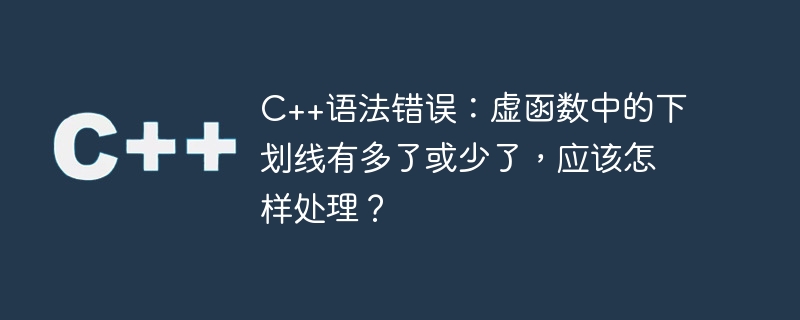Home >Backend Development >C++ >C++ syntax error: There are too many or too few underscores in virtual functions. What should I do?
C++ syntax error: There are too many or too few underscores in virtual functions. What should I do?
- 王林Original
- 2023-08-22 14:53:161048browse

In C language, virtual function is an important concept, which is widely used in important features such as class inheritance and polymorphism. When declaring a virtual function, it is often necessary to use underscores to indicate syntax such as function overloading or rewriting. However, if the number of underscores in the virtual function declaration is incorrect, it will cause the compiler to report an error and also affect the normal operation of the program. This article will introduce how to deal with the incorrect number of underscores in C syntax errors.
1. Definition of C virtual function
In C, a virtual function is defined by adding the virtual keyword before the function declaration. A virtual function can be a member function of a class or a function in a base class. It is defined as follows:
class BaseClass{
public:
virtual void virtualFunction() { }
};In the above code, BaseClass is a base class, and the virtualFunction() function is a A virtual function is declared using the virtual keyword in front of it. In a derived class, if you override the virtual function in the base class, you must use the override keyword to declare it in the derived class, as shown below:
class DerivedClass : public BaseClass{
public:
void virtualFunction() override { }
};In the above code, DerivedClass is of BaseClass Subclass, which overrides the virtual function virtualFunction() and declares it using the override keyword.
2. The problem with the wrong number of underscores in the virtual function declaration in C
In C, it is often necessary to use underscores in the declaration of virtual functions to indicate syntax such as function overloading or rewriting. However, if the number of underscores in the virtual function declaration is incorrect, it will cause the compiler to report an error and also affect the normal operation of the program.
For example, in the following code, multiple underscores are used in the virtual function declaration of the base class, but only one underscore is used in the declaration in the derived class:
class BaseClass{
public:
virtual void virtualFunction__ () {};
};
class DerivedClass : public BaseClass{
public:
void virtualFunction_ () override {};
};In the above code , the compiler will prompt an override keyword error for the virtual function because the number of underscores used in the virtual function declaration in the derived class is inconsistent with that in the base class.
3. Solution
If the number of underscores in the C virtual function declaration is wrong, you can consider the following two solutions:
1. Keep the declaration syntax of the virtual function consistent
In order to avoid the wrong number of underscores, you can use the method of keeping the declaration syntax of virtual functions consistent. Specifically, the same number of underscores should be used in virtual function declarations for base and derived classes. For example, in the following code, an underscore is used in the virtual function declaration in both the base class and the derived class:
class BaseClass{
public:
virtual void virtualFunction_() {};
};
class DerivedClass : public BaseClass{
public:
void virtualFunction_() override {};
};In the above code, an underscore is used in both the base class and the derived class to indicate the function. Syntax such as overloading or rewriting, so the compiler does not throw an error and the program runs normally.
2. Use editor automation tools
When using an editor to write C code, you can also use editor automation tools to avoid errors in the number of underscores. For example, some advanced editors automatically add the correct number of underscores in virtual function declarations to avoid this error. In addition, these editors will also issue warnings when the number of underlines is incorrect, helping programmers to find and correct errors in time.
In short, the wrong number of underscores in the virtual function declaration in C is a common syntax error, which may cause the program to fail to compile or run abnormally. To avoid such problems, you need to keep your virtual function declaration syntax consistent and make full use of editor automation tools to improve the syntax correctness of your code.
The above is the detailed content of C++ syntax error: There are too many or too few underscores in virtual functions. What should I do?. For more information, please follow other related articles on the PHP Chinese website!

